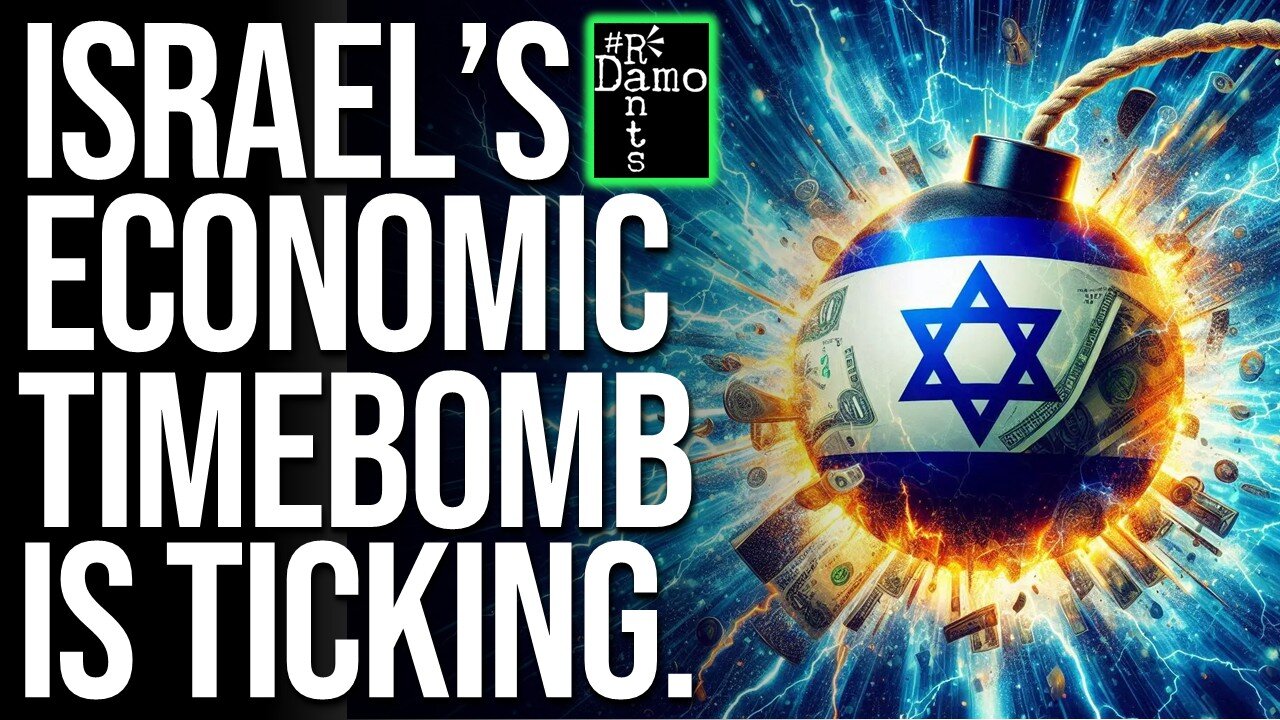Premium Only Content

They Chose Genocide Over Growth – And the Bill Has Finally Arrived
Right, so Israel once prided itself on being the so-called “Start-Up Nation,” a beacon of technological innovation and economic resilience in a turbulent region. It cultivated a narrative of dynamism and modernity, presenting itself as a nation that could transcend regional instability through ingenuity, attracting global investors, venture capitalists, and multinational corporations eager to participate in its high-tech miracle. That image, carefully curated over decades, is now falling apart on steroids.
Since October 2023, Israel has launched a campaign of devastation in Gaza, as we all know, widely condemned as genocide as it blatantly is, while opening new fronts against Hezbollah in Lebanon, confronting Houthi maritime disruptions in the Red Sea, striking Iran directly and seizing more territory in Syria. The cumulative effect of all of these military fronts has pushed Israel into a war economy of staggering proportions, burning through tens of billions of dollars every month while eroding the very economic pillars on which its prosperity was built. Well all the investment, all the tech, all that economic stability is collapsing. Israel’s war machine is bigger than it an support and its reaching that point of reckoning now.
Right, so the consequences are visible everywhere. Investor confidence, once a hallmark of Israel’s economic stability, is evaporating. Foreign direct investment has plummeted. Major multinational corporations such as Intel and Samsung Next are pulling back or shutting operations. Sovereign wealth funds and institutional investors are divesting from Israeli companies, citing both reputational risk and practical concerns about stability. Meanwhile, the conscription of tens of thousands of reservists has gutted key sectors of the workforce, particularly that tech industry, which has long been Israel’s economic engine.
The fundamental question, therefore, is not whether Israel’s economy is suffering—it is how long this downward spiral can continue before it reaches its inevitable economic breaking point.
Israel’s economic success has always been more fragile than its self-congratulatory branding suggested. The high-tech sector, celebrated as a model of Israeli innovation, is not only the backbone of the economy but also its greatest vulnerability. High-tech accounts for almost 20 percent of Israel’s GDP, roughly half of its exports, and around a quarter of all tax revenues. This prosperity depends almost entirely on global integration, foreign capital, and investor confidence. Unlike natural-resource economies, Israel’s growth depends on intellectual capital, which can move quickly across borders.
Before October 2023, this model functioned because Israel managed to maintain the perception of stability, at least in the areas that mattered to international investors. It projected itself as a Western-facing liberal democracy committed to economic openness, even if its treatment of Palestinians told a different story. But the war shattered this illusion.
The data is stark. According to Al Jazeera, foreign direct investment fell by nearly 30 percent in 2023, plunging to its lowest level since 2016. Much of the high-tech investment that had driven Israeli growth slowed sharply, with an estimated 30 percent decline in foreign funding. A survey cited in the Economic Impact of the Gaza War study found that almost half of Israeli high-tech firms froze new investments, a quarter relocated operations abroad, and 44 percent reduced their workforce. These are not temporary wartime disruptions; they are signs of a deeper erosion of trust.
This fragility also means that Israel cannot simply “produce its way” out of this crisis. Unlike large economies that can cushion war-related costs with domestic industrial output, Israel relies on a globally integrated economic network. When that network frays—when venture capitalists relocate their portfolios, when tech firms shift operations abroad, and when sovereign wealth funds divest—it leaves Israel dangerously exposed.
Perhaps no single event better captures this collapse in investor confidence than one of the most recent stories involving Intel’s decision to scale back its operations in Israel. For decades, Intel symbolised the success of Israel’s tech-driven economy. It was the country’s largest private employer in the high-tech sector, contributing 6 to 7 percent of total exports and over one percent of GDP. Yet in the wake of the Gaza war, Intel has begun retreating.
According to Calcalist, Intel froze construction on its planned $25 billion Fab 38 semiconductor facility in Kiryat Gat, despite receiving over $3 billion in Israeli government grants to fund the project. The Tom’s Hardware report goes further, confirming that Intel has not only cut hundreds of jobs but is even considering shutting down its existing Fab 28 plant altogether. Layoffs at Fab 28 have already hit production and mid-management roles, reducing Intel’s Israeli workforce to its lowest level in over a decade.
The reasons are clear: war instability, rising operating costs, and plummeting investor confidence. As PressTV reported, Intel’s global revenue losses have forced cost-cutting, but its downsizing in Israel reflects more than just global trends; it reflects growing concerns about operating in a country at war.
Intel’s retreat is more than an economic loss; it is a symbolic turning point. If the largest and most entrenched foreign investor is scaling back, what message does that send to others? The ripple effect is already visible. Samsung Next announced in April of last year that it was shutting down its Tel Aviv operations, explicitly citing the economic pressures of the ongoing war. Other multinational corporations may not yet have announced full exits, but expansion plans are quietly being shelved, and new investments are being diverted to less risky markets like India, Eastern Europe, and the UAE.
The broader tech sector, Israel’s so-called crown jewel, is in crisis. Venture capital funding, which once poured into Israeli start-ups, has slowed dramatically. High-tech exports, which make up half of Israel’s foreign trade, have slowed significantly since the war began. What investment remains is increasingly being directed toward Israeli entrepreneurs who have relocated abroad.
This relocation trend reflects a deeper and perhaps irreversible brain drain. High-tech talent is highly mobile, and Israeli engineers and developers are increasingly leaving for Europe, the US, or the UAE, where they can work free from the risks of conscription and reputational damage. The Israel Democracy Institute estimates that high-tech has lost at least 7 percent of its total work hours due to reservist mobilisation. Even when these workers return, the disruption to research and development cycles delays product rollouts and undermines Israel’s competitiveness.
Start-ups are also quietly moving their headquarters abroad, often registering in the US or Europe to secure funding from investors wary of being tied to Israel during a genocide. These companies are unlikely to return even after the war ends, as relocation offers them easier access to foreign markets and removes them from the reputational risks associated with Israel’s military actions that will persist even when everything we are witnessing now finally ends, Israel’s reputation and its propaganda in pieces as it is.
On top of war-related economic disruption, Israel faces a reputational crisis that is translating into divestment too. The genocide in Gaza has prompted institutional investors to reassess their exposure to Israeli companies. Sovereign wealth funds and pension schemes are leading the way, signalling a broader trend.
The Norwegian Government Pension Fund, the world’s largest sovereign wealth fund, divested from Bezeq and Paz Retail & Energy due to their operations in occupied territories. The UK’s Universities Superannuation Scheme, Britain’s largest private pension fund, sold all Israeli bonds worth around £80 million, citing both financial and ethical concerns. Ireland’s sovereign investment fund similarly exited several Israeli companies, and other European firms are scaling back financing or withdrawing from Israeli-linked projects altogether.
These moves may not yet represent an economic collapse, but they are warning signs. Institutional investors tend to act conservatively, and when they begin divesting, it suggests they view Israel as a long-term reputational and financial risk. The release of a UN report listing companies complicit in Israel’s actions in Gaza has only increased the pressure on Western corporations to sever ties.
The economic costs of war extend far beyond lost investment though. Israel’s own fiscal decisions are accelerating the crisis. The mobilisation of hundreds of thousands of reservists has gutted productivity across the economy. The burden is particularly heavy on small businesses and self-employed workers, many of whom have lost clients or gone bankrupt due to prolonged absence. A Ynet survey found that 75 percent of reservists reported financial hardship, and over 40 percent lost or left their jobs due to reserve duty.
At the same time, war spending has reached unsustainable levels. According to the Arab Center DC, Israel is spending around 1 billion NIS per day on military operations, with monthly costs exceeding $12 billion when accounting for operations against Hezbollah and Iran. The government recently approved an additional 42 billion NIS in defence spending, pushing the annual defence budget to 9–12 percent of GDP.
These expenditures are not just short-term costs; they are crowding out investment in infrastructure, education, and civilian technology. The war economy is draining resources from the very sectors that once drove Israel’s growth.
Adding to these domestic pressures is the growing impact of international sanctions and diplomatic isolation. The Hague Group, a coalition of Global South nations, has begun coordinating port bans, arms embargoes, and legal action against Israeli officials. While these measures are still in their early stages, they have the potential to severely disrupt Israel’s access to key imports, particularly dual-use technologies essential for its semiconductor and high-tech manufacturing sectors.
The reputational cost is also increasing. The UN report listing companies complicit in Israel’s genocide has already prompted divestment campaigns, and BDS-linked boycotts are gaining momentum, particularly in Europe. These trends are likely to intensify as the war drags on and images of destruction in Gaza continue to dominate global media.
For now, US financial and military support is keeping Israel afloat. Washington has provided tens of billions in emergency aid, supplied munitions, and encouraged US institutions to keep buying Israel Bonds. But even American support has limits.
Domestically, US public opinion is shifting. Polls show declining support for unconditional aid, particularly among Democrats and younger voters. As the 2026 midterm elections become more and more present in the minds of politicians, political pressure on Washington to condition aid on de-escalation is likely to grow. Economically, the US cannot indefinitely bankroll a war economy burning through $12 billion a month without facing its own political backlash.
If US support becomes conditional, Israel may be forced to negotiate a ceasefire or face a fiscal crisis. Washington’s patience is not infinite, and history suggests that economic leverage is often the most effective tool for compelling political change.
Israel is not yet in full economic collapse, but the trajectory is unsustainable. If current trends continue, a gradual breaking point could arrive within 12 to 18 months, with rising debt, falling investor confidence, and credit downgrades forcing austerity. An accelerated timeline is also possible. If the Hague Group expands sanctions, if BDS gains further traction, or if the US begins conditioning aid, Israel could be forced into de-escalation much sooner or face going bust. Would Benjamin Netanyahu bankrupt his own country to keep himself in power and out of the courtroom for those corruption charges? He can’t hide behind food poisoning forever after all?
The war in Gaza was justified by its architects as a matter of national security, but it has become an act of economic self-destruction. The “Start-Up Nation” is now a war economy spiralling toward economic collapse, its high-tech engine faltering, investors fleeing, and public finances collapsing under the weight of endless conflict.
History offers clear lessons. Apartheid South Africa learned that economic isolation could succeed where diplomatic pressure failed. Israel is now discovering the same truth: that genocide carries a price tag, and it is one even the US cannot pay forever.
On top of all of this, there is the logistics crisis Israel is increasingly facing, not just from the likes of the Hague Group, that being one such measure they are preparing to enact, but even within Europe, as a group of Greek dockworkers made very clear in the last week, going on strike and refusing to bend to Israeli will even if their government does – the power of trade unionism in fighting genocide as this has proven to be. Get all the details of that story in this video recommendation here as your suggested next watch.
Please do also hit like, share and subscribe if you haven’t done so already so as to ensure you don’t miss out on all new daily content as well as spreading the word and helping to support the channel at the same time which is very much appreciated, holding power to account for ordinary working class people and I will hopefully catch you on the next vid. Cheers folks.
-
 9:13:12
9:13:12
The Charlie Kirk Show
16 hours agoLIVE NOW: Building A Legacy, Remembering Charlie Kirk
2.12M892 -
 1:55:20
1:55:20
The White House
8 hours agoPresident Trump Participates in the Memorial Service for Charlie Kirk
83.5K88 -
 1:02:41
1:02:41
Sarah Westall
7 hours agoDomestic Terror Operation: Death Threats, Smear Campaigns, Gang Stalking w/ Journalist Sarah Fields
29.7K7 -
 1:51:40
1:51:40
Nerdrotic
7 hours ago $10.12 earnedGobekli Tepe Discovery and "Reconstruction" | Forbidden Frontier #118
66.2K7 -
 29:07
29:07
Tactical Advisor
7 hours agoATF Changes Ruling on SBR & Tacpack unboxing | Vault Room Live Stream 039
69.4K15 -
 2:00
2:00
From Zero → Viral with AI
13 hours ago $1.84 earnedAre You Being Left Behind? Why AI Marketing is No Longer Optional
35.1K4 -
 9:10
9:10
BlackDiamondGunsandGear
11 hours agoI Finally Got it! / Now i need to BUILD IT!
24.7K7 -
 9:44
9:44
Millionaire Mentor
3 days agoCharlie Kirk Brings Woke Student To STUTTERING Over White Privilege Lies
28.3K7 -
 24:12
24:12
MudandMunitions
12 hours agoOff-Roading with NYPrepper Wild Elk & PA’s Most Remote Backroads
17K1 -
 DVR
DVR
Bannons War Room
7 months agoWarRoom Live
37.4M8.69K